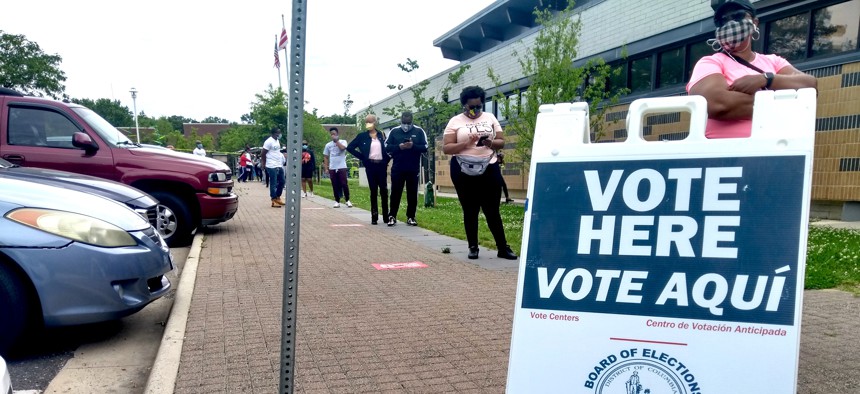Pandemic, Civil Unrest Complicate Voting in the Nation’s Capital

Voters wear masks and maintain distance from one another while they wait in line to cast ballots at the Hillcrest Recreation Center in Washington, D.C. on Tuesday June 2, 2020. Route Fifty / Andrea Noble
Washington, D.C. is among the jurisdictions that encouraged residents to vote by mail to stay safe amid the coronavirus pandemic, but voters who came out to the polls Tuesday still encountered long lines.
Voters in the nation’s capital faced long lines at many of the 20 polling places open for Tuesday’s primary elections, despite the city’s efforts to encourage early and absentee voting to prevent the spread of the novel coronavirus.
Eight states and Washington, D.C. held primaries on Tuesday, contending with both protests over the death of George Floyd in Minneapolis police custody and a worldwide pandemic. Many states had sought to expand vote-by-mail options for residents to cut down on the potential for voters and election workers to be exposed to the coronavirus at polling places.
In Washington, D.C., voters have been able to cast ballots early at any of the 20 voting centers since May 22 or could request absentee ballots in order to vote by mail. But on Tuesday, some people waited for hours to vote in person, standing in line long past the 7 p.m. curfew set by the city to tamp down on civil unrest. Among those who waited in line for an hour at the Deanwood Recreation Center in Northeast D.C., some said they didn't know how to vote by mail and others simply felt more comfortable voting in person.
“I don’t trust it,” said Gloria Robinson, a 75-year-old D.C. resident, of the idea of mailing in her ballot. “I’m worried it could get lost or thrown away.”
Asked whether she was concerned about voting during the pandemic, Robinson, who wore a face mask, said she also had hand sanitizer and several pairs of disposable gloves in her purse. She intended to put a fresh pair on when she entered the center to vote.
Signs at the entrance of polling places across the city informed voters they were required to wear face masks. Only 10 voters were allowed inside at a time and placards on the ground outside encouraged voters to stand six feet apart while waiting in line.
At Deanwood, masked voters stood several feet apart in a line that stretched around the block and down an alleyway. At the Hillcrest Recreation Center in Southeast D.C., election workers had strung up caution tape to create a maze-like line that wrapped around the outdoor courtyard. One man who gave his name as Charles, said he had tried to vote at Deanwood but felt uncomfortable by how close people were standing to one another in line. He left and drove to Hillcrest instead, where the wait time was about 30 minutes.
“This feels safer,” he said.
Asked why he hadn’t opted to vote by mail, Charles said he didn’t know enough about the process until it was too late to register but that he’d consider it for the November presidential election.
Local news reports indicate that not everyone who requested an absentee ballot had received one. To remedy the issue, the D.C. Board of Elections would allow some people to cast ballots by email, said D.C. Councilmember Elissa Silverman.
As of May 28, more than 86,000 registered D.C. voters had requested absentee ballots. As of Sunday, the D.C. Board of Elections had received about 37,000 ballots, said spokeswoman Rachel Coll. As of 5 p.m. Tuesday, more than 12,700 people had voted early in person, according to data provided by the D.C. Board of Elections.
In addition to complications from the pandemic, the nation’s capital and cities across the country are also trying to ensure that protests against police brutality do not limit voters’ access to polling places.
In Philadelphia, a 6 p.m. curfew had been in effect the past two nights. But city officials pushed back the start time of Tuesday’s curfew until 8:30 p.m. to allow voters time to safely get home from the polls.
In Washington, D.C., polls close at 8 p.m. Tuesday. Mayor Muriel Bowser said Tuesday morning that the city’s 7 p.m. curfew would remain in effect but that poll workers and voters trying to get home would be exempt.
D.C. Council Member Charles Allen and more than 40 local neighborhood representatives pleaded with the mayor to push back the curfew to avoid confusion, particularly since federal law enforcement not under city control were expected to be out in force Tuesday night.
“With polls closing at 8pm, it will disenfranchise voters, especially black voters wanting to avoid a police encounter,” Allen wrote on Twitter. “And poll workers, election observers, & volunteers will be scared to get home.”
Bowser, however, said she didn’t think the curfew would disenfranchise voters.
“I don’t expect that will be an issue,” she said during a Tuesday morning news conference.
D.C. elections officials did not release any results from the primary Tuesday as voting continued late into the night. Bowser had previously warned that greater reliance on mail-in ballots would mean that it could take longer than city residents are used to for final results to be tallied.
“I think that’s going to feel strange to Washingtonians,” she said. “But you can’t have it both ways.”
Andrea Noble is a staff correspondent with Route Fifty.
NEXT STORY: In a Rural Valley, Virus Threat Hangs Heavy Over Summer Tourist Season





